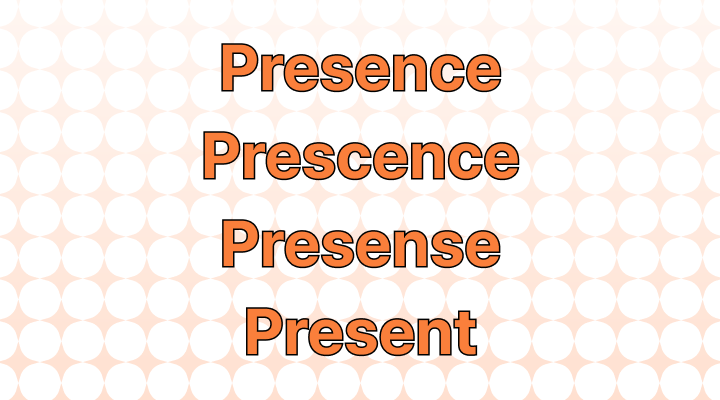- Presence: "Presence" refers to the state of being present, existing, or the fact of being in a particular place at a particular time. It can also denote the quality of being noticeable or palpable.
- Prescence: "Prescence" is not a standard English word and is considered incorrect.
- Presense: Presense is the incorrect spelling of presence.
- Present: "Present" is a versatile word that can be used as an adjective or a noun. As an adjective, it means "existing or occurring now" or "being in a particular place." As a noun, it refers to a gift or something given to someone.

🎁 Novelty Store: Meaning and Examples
🎁 Verb Tenses
🎁 Contemporary Meaning and Examples
Below are some real life examples of the words above:
Birthday Party: When someone receives a birthday gift, it is often referred to as a "present." For example, "She was excited to unwrap her presents at her birthday party."
Business Meeting: In a business setting, "present" can refer to someone's attendance at a meeting. For instance, "All team members need to be present at the quarterly review meeting."
Business Meetings: In a business context, "presence" often refers to someone's physical or virtual attendance at a meeting. For example, "Your presence is required at the board meeting tomorrow."
Online Communication: In the digital age, "online presence" is commonly used to describe a person's or company's visibility and influence on the internet. For instance, "Building a strong online presence is crucial for e-commerce businesses."
Meditation and Mindfulness: In practices like meditation and mindfulness, "presence" refers to being fully aware and focused on the current moment, as in "He achieved a deep sense of presence during his meditation."

In the much loved Kung Fu Panda movie, Oogway famously says, "Yesterday is history, Tomorrow is a mystery, but Today is a gift. That is why it is called the present." This quote implies that the word present does not only refer to a gift, but it means now, or in the moment.
Another word that has a similar meaning to present is presence. Engram explores these two words, and the common incorrect variant, prescence, in this blogpost.

What is the difference?
The key difference between "presence," "prescence," "presense," and "present" lies in their spelling and meanings:
When and how to use presence vs. prescence vs. present
Presence
Use "presence" when referring to someone's existence in a specific location or situation.
In a sentence, "presence" is typically used to describe or refer to the existence or state of being of a person, thing, or quality in a particular place or situation. It can appear in various positions within the sentence, depending on the context and the emphasis you want to place on it.
Subject of the Sentence
- "Her presence at the event was highly anticipated."
Direct Object:
- "They noticed her presence in the room."
Object of a Preposition:
- "In the presence of royalty, one should show the utmost respect."
As a Modifier:
- "The calming presence of the ocean helped him relax."
Part of Idiomatic Expressions:
- "His presence of mind during the crisis saved lives."
Prescence
Avoid using "prescence" as it is a misspelling of "presence."
Presense
Avoid using "presense" as it is a misspelling of "presence."
Present
Use "present" when you want to describe something that exists or occurs at the current moment or when referring to a gift or offering.
The word "present" can be used in various ways in a sentence, depending on its context and the intended meaning. Here are some common uses of "present" in sentences:
Noun:
- She gave me a beautiful present for my birthday.
Adjective:
- I am currently present at the meeting.
Verb:
- He will present his findings during the conference.
Preposition:
- The museum houses a collection of artifacts from the present century.
Idiomatic expressions or phrasal verbs:
- I cannot meet with you at present; I'm busy with a project.
To remember the difference between "presence" and "present," it's helpful to focus on their unique qualities.
Remember "presence" as the state of being there (e.g., someone's existence in a room).
Recall that "present" can be a gift, and it can also mean something happening right now or someone being in attendance.

Is presence from the word present?
While "presence" and "present" share a common historical origin in Latin, they have evolved into distinct words with different meanings and usages in modern English.
"Presence" comes from the Latin word "praesentia," which means "being at hand" or "being present." The term "presence" refers to the state of being present or existing in a particular place or at a specific time. It is often used to describe the quality of being there or the impact one has in a given situation, as in "Her presence in the room was commanding."
"Present," on the other hand, comes from the Latin word "praesens," which is the present participle of "praeesse," meaning "to be before" or "to be at hand." "Present" can function as an adjective, noun, verb, or adverb and is used in various ways, including referring to something given as a gift, indicating something happening now, introducing something, or specifying a time frame, as in "I will present you with a gift at the party" or "He is present at the meeting."
Synonyms and Antonyms
Expanding your vocabulary is always beneficial. Here are some synonyms and antonyms for "presence" and "present":
Synonyms for "presence":
- existence
- attendance
- company
- appearance
- being
- proximity
Synonyms for "present" (adjective):
- current
- existing
- now
- contemporary
- today
Synonyms for "present" (noun):
- gift
- offering
- donation
- token
- bestowal
Antonyms for "presence":
- absence
- disappearance
- nonexistence
Antonyms for "present" (adjective):
- past
- previous
- former
- bygone
Antonyms for "present" (noun):
- absence
- lack
- deprivation
- want

Common Idioms
There are several idiomatic expressions involving the word "presence."
- "In the presence of": This phrase means being in the company of someone or something and is often used in a respectful or formal context.
- For example, "In the presence of royalty, one should show the utmost respect."
- "Presence of mind": This idiom refers to the ability to think clearly and make effective decisions, especially in stressful or unexpected situations.
- For instance, "His presence of mind during the emergency situation saved many lives."
Summary
Understanding the distinction between "presence," "prescence," presense," and "present" is essential for effective communication and to avoid common spelling errors. "Presence" refers to someone's existence or being there, "prescence" and "presense" are misspellings to be avoided, and "present" can mean something existing now or a gift. By expanding your vocabulary with synonyms and antonyms and learning common idiomatic expressions, you can enhance your language skills and use these words with confidence. So, remember the tricks, use these words correctly, and let your linguistic "presence" be known.
Want to sound like a native speaker?
Engram’s AI-powered grammar checker makes your English sound like a native speaker’s, suggesting natural English expressions on top of fixing grammar, spelling, punctuation, word order, and vocabulary.

Reference:
















